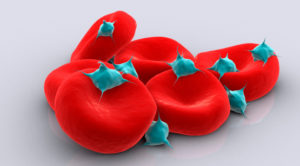Thrombotic thrombocytopenic purpura (TTP) is a rare disease in which autoimmune antibodies target ADAMTS13, a protease that cleaves the von Willebrand factor. This leads to a severe ADAMTS13 deficiency allowing unrestrained adhesion of the von Willebrand factor to platelets. Patients with TTP are at a severe risk of mortality and present with thrombocytopenia, hemolytic anemia, thrombotic events and tissue ischemia. Standard care for these patients involves immunosuppressive drugs and daily plasma exchange. In a multicenter, double-blind, phase 3 trial, researchers randomized 145 patients with TTP to receive caplacizumab (an immunoglobulin fragment that inhibits the von Willebrand factor from binding to platelets) or placebo along with daily plasma exchange. The median time to normalization of the platelet count was shorter among the patients receiving caplacizumab than among patients receiving placebo (2.69 days vs. 2.88 days, P=0.01). Furthermore, patients receiving caplacizumab had a lower incidence of death, recurrence of TTP, or a thromboembolic event during the study. Adverse events were similar in both arms of the study, but patients receiving caplacizumab had slightly higher rates of low-grade mucosal bleeding than those receiving placebo (65% vs 48%). The addition of caplacizumab to standard care plasma exchange therapy for acquired TTP patients should be carefully considered.
Reference:

